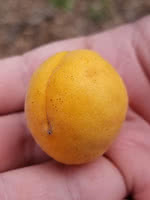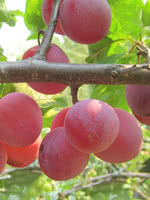Mon-Fri 9am - 5pm Mountain time
Manchurian Apricot vs Pembina Plum
Prunus armeniaca var. mandshurica
Prunus nigra x salicina Pembina
Manchurian Apricot is a winter-hardy relative of the native plum. This tree can stand some drought, but will not handle standing water or saturated moist soils. It can be used in shelterbelts, hedges, or as an ornamental. Manchurian Apricot will also attract songbirds, rabbits, and other rodents if left uncontrolled.
This tree will produce fruit once it reaches maturity at between two and five years old. Other famous cultivars of Manchurian Apricot include Scout Apricot, Moongold, and many more.
Pembina Plum is one of the best-tasting plums that can be planted on the prairies. It is semi-freestone with orange flesh that is soft, juicy, and sweet which contrasts with the thick, sour, dark red skin. The plums can grow up to 5 cm in diameter and are well-suited for fresh eating, baking, and preserves.
They typically ripen in mid to late August and should be picked as soon as they are ripe. If left too long, the fruit will fall off the tree.
Pembina Plum is a hybrid between Canada Plum and Japanese Plum. For fruit production, it needs to be planted with another variety for cross-pollination. Canada Plum and American Plum are considered universal pollinizers.

